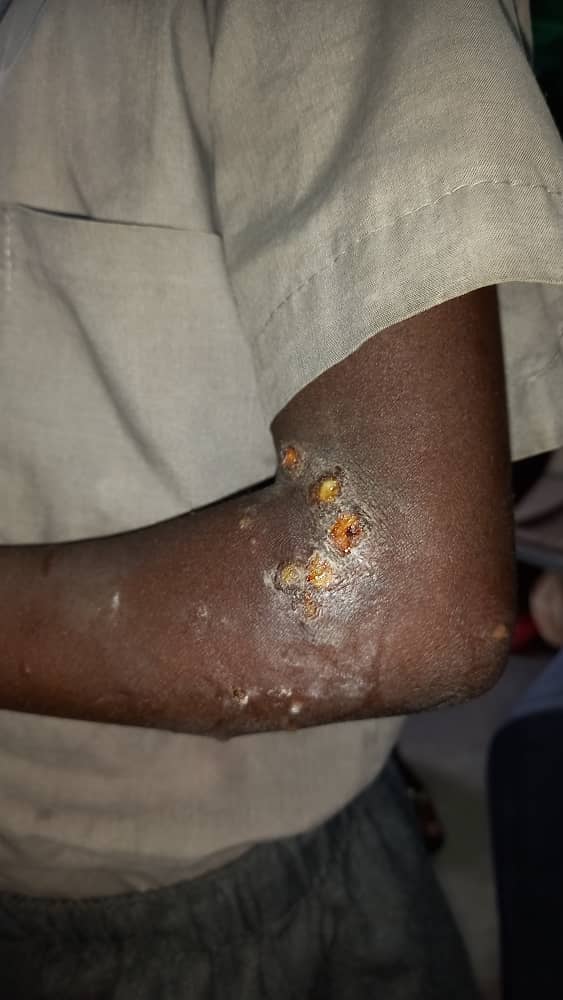RUNDU – Scabies has now become a national concern after cases of outbreaks in most regions.
The ministry of health yesterday urged the public to remain calm and comply with the preventative measures to contain and prevent further transmission.
In a statement, health minister Kalumbi Shangula yesterday said 3 454 cases of scabies were reported countrywide during the period of January-March 2022.
The cases are: Kunene (1 418), Ohangwena (708), Otjozondjupa (402), Kavango West (375), Kavango East (204), Omusati (130), Oshana (104), Omaheke (46), Hardap (20), Oshikoto (20), Erongo (17), and //Kharas with 10 cases.
Scabies is transmitted from one person to the other through close skin contact.
Symptoms in people without a previous exposure usually develop in four to six weeks but have been shown to develop as early as one week and as late as one year.
Intense itching is the primary symptom, and it is often intensified at night.
Other symptoms include red rash popular eruptions, pus-filled lesions and growth of abnormal skin tissue.
Shangula said the treatment of scabies involves the elimination of the infestation by medication, using several creams or lotions – and all cases and symptomatic contacts must be treated with scabicide.
The minister advised the public that all infested individuals must be isolated from common areas, such as schools or workplaces.
He further said clothing and beddings should be disinfected.
If untreated, these microscopic mites can live on your skin for months.
They reproduce on the surface of your skin, and then burrow into it and lay eggs.
This causes an itchy, red rash to form on the skin in-between fingers and toes – mostly on the feet and buttocks, with some raw areas consistent with impetiginised scabies.
Shangula said the most affected populations are communities living along the northern borders, learners in the affected regions, and migrant populations in urban and peri-urban areas, where access to clean water and sanitation facilities is inadequate.
At the end of March, this newspaper reported a scabies outbreak forcing children out of school and the Ohangwena regional health directorate scrambling to send a team of professionals to the schools.
The region’s 10 circuits recorded cases among learners and teachers.
Two weeks ago, over 200 learners from Naucova Primary School in Kavango West and some members of the public have been attacked severely by the bacteria.
Currently, learners at Mbandu Murangi Primary School at Siko village in Kavango West are battling the severe and relentless itching that caused blisters on their bodies.
Some already have serious lesions on their bodies.
To add salt into the wound, Kavango West health director Fransisca Hamutenya said, “At the moment, due to poor network, we are unable to log into our system to run the reports to see how many cases have been reported at various health centres, but the outbreak started beginning of March.”
Hamutenya told New Era that the region has been without medication to cure scabies for quite some time.
“Although some learners are recovering, there are about 20 learners with serious wounds,” said the principal of Mbandu Murangi Primary School, Thadeus Sikuvi.
“It has been ongoing for some time now; we have been trying to take some to nearby clinics but are unable to take a large number of them due to transport challenges. We informed health officials to visit our school but they told us they were unable to come due to lack of transport,’’ he said.
Sikuvi told New Era the situation is affecting the learning and teaching, as, at some point, they have to send some learners home for parents to take them to hospital.
“Some are now recovering. But are just at home to avoid spreading to others,” he said.
Hamutenya said scabies is a serious case in Kavango West.
“It normally becomes worse in when approaching winter, and during winter when hygiene is not highly observed by learners and children in general; adults do have it too,” she said on Monday.
The public is further urged to maintain good hygiene and sanitation, including hand washing.
The ministry of health, together with the ministry of education, has ongoing investigations to establish the magnitude and cause of scabies transmission in the affected regions.



